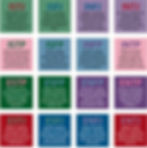Hi, welcome to this blog post about the Myers-Briggs Type Indicator for personality. This is written as part of an assessment for my Consumer Behaviour module on my Digital Marketing Integrated Degree with QA and Solent University. If you’re here reading this, I would very much appreciate your feedback or additional observations/knowledge in the form of a comment!
What is Personality?
Soloman et al (2019) define personality as:
“The inner psychological characteristics that both determine and reflect how a person responds to his or her environment”
A person’s personality is individual and unique to each person. It is self-serving and consistent over time, influenced by a person’s beliefs and core values. Having said that, we can still study personality and make sweeping generalisations to groups of people with similar personalities. We can do this in several different ways including psychoanalysis (pioneered by Freud), psychographic surveys such as the VALS framework that I wrote about in my last post, and typology – potentially the most applicable to our work in marketing?
The Myers-Briggs Type Indicator
The Myers-Briggs Type Indicator (MBTI) is the most popular approach in typology. You may have come across similar online quizzes based upon this system, such as 16personalities.com.
The MBTI is based upon the work of Cal Jung (1971), assessing individuals on 4 dimensions, assigning them to one of two categories for each dimension:
Favourite World: are you an introvert or an extrovert?
Information: are you sensing, preferring to rely on information you take it, or are you more driven by your intuition, preferring to add meaning?
Decisions: Do you favour logic and consistency (thinking) or are you more concerned with feeling?
Structure: Do you prefer making decisions and sticking with them (judging) or do you like to stay open to new information (perceiving)?

Image sourced from lavendaire.com
Once answering the questions of the MBTI, you can then be grouped in to one of 16 personality types, based upon the above possible outcomes (I’m an INFJ!).
Issues with the Myers-Briggs Type Indicator
That’s all great fun, but is it actually useful? Or even accurate?
Any type of questionnaire comes with a set of biases that can influence the outcomes. One of which is self-selection bias, a “type of bias in which individuals disproportionately select themselves into a group” (Elston, 2021), which may be particularly prominent within psychographic indicators, particularly in workplace settings. Other factors that may seem small can have a big impact on self-response surveys, even down to the time of day that it is taken.
Another issue that may arise is that these questions rely on an accurate sense of self. However, we’re most likely to have a distorted sense of self with multiple views of our self-image (Schiffman et al 2012), in which case, how can we answer questions about ourselves if we don’t objectively know ourselves?
The MBTI has also been under scrutiny from fellow researchers for several years. Garden (1991) suggests that it is based upon type theories (from both Jung and Myers) which have little empirical evidence to accurately back them up. And how reliable can a framework be if not based upon theories that can be proven?
Can you effectively apply it to B2B?
The other question for marketers is can it be applied to B2B marketing? My personal work context lies within business to business marketing, so how do I use this?
Some may argue that you can use the MBTI to best identify how to appeal to the individual buying from us on behalf of their company. The personality types do suggest certain job roles that each personality type may be best suited to, which have been acknowledged as being accurate (Bealing Jr, Baker and Russo 2006). In which case, we could identify the personality type best suited to sales and buying roles and tailor our marketing messages to them.
However, in my opinion, this wouldn’t have a significant impact. Those who buy from us often come with a set brief of what they’re looking for including specs, price, delivery times etc. If we’re unable to meet the requirements of what they need, its highly likely they’ll move to the next company who may be able to meet those needs instead. There is very little scope in that to appeal to personality types and build rapport from the offset. Therefore, in B2B I believe it is more important to be able to meet the needs of the business you’re looking to sell to, rather than the individual needs of the buyer.
References
BEALING JR, W. E., R. L. BAKER and C. J. RUSSO, 2006. Personality: What it takes to be an
accountant. The Accounting Educators' Journal, 16.
ELSTON, D. M., 2021. Participation bias, self-selection bias, and response bias. Journal of American Academy of Dermatology. Available from: https://www.sciencedirect.com/science/article/pii/S0190962221011294?via%3Dihub
GARDEN, A., 1991. Unresolved issues with the Myers-Briggs type indicator. Journal of Psychological Type, 22(1), 3-14
JUNG, C. G., 1971. Psychological types. In: G. ADLER and R. F.C. HULL, 6 eds. The collected works of C. G. Jung. Princeton, NJ: Princeton University Press.
SCHIFFMAN, L. G., L. L. KANUK and H. Hansen, 2012. Consumer Behaviour: A European Outlook. 2nd ed. Harlow, England: Pearson
SOLOMAN, M. R., S. ASKEGAARD, M. K. HOGG and G. J. BAMOSSY, 2019. Consumer Behaviour: A European Perspective. 7th ed. Harlow, England: Pearson